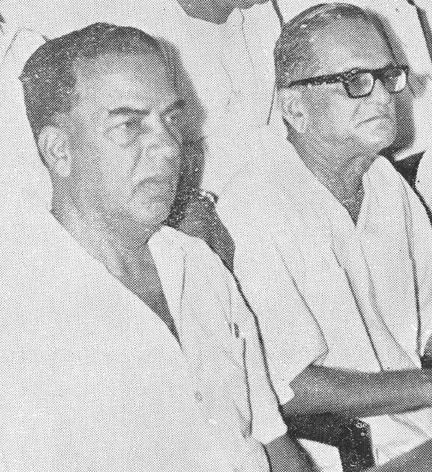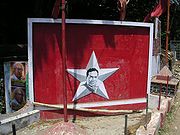
A. K. Gopalan
Encyclopedia
Ayillyath Kuttiari Gopalan , 1 October 1904 to March 22, 1977, popularly known as A. K. Gopalan or AKG, was an India
n communist
leader and first leader of opposition of India.
of Northern Kerala
and educated in Tellichery. By the time he became a teacher, India's independence movement was becoming energized by Mahatma Gandhi
. Gopalan took part in the Khilafat Movement
which prompted a marked change in his outlook, transforming him into a dedicated fulltime social and political worker.
and began playing an active role in the Khadi Movement and the upliftment of Harijan
s. He was arrested for participating in the salt satyagraha
in 1930.
While in prison he got acquainted with communism and became a member of the Congress Socialist Party
and later the Communist Party of India
when it finally took shape in Kerala in 1939. He led the hunger march from Malabar region to Madras in 1937 and the Malabar Jatha in support of the movement for responsible government in Travancore
.
 The outbreak of the Second World War in 1939 prompted an upsurge in activism against British domination, and Gopalan was again arrested. But in 1942 he escaped from prison and remained at large till the end of the war in 1945. He was arrested again shortly after the end of the war and was still behind bars when India became independent on August 15, 1947. He was released a few weeks later. Thereafter he was a member of Lok Sabha
The outbreak of the Second World War in 1939 prompted an upsurge in activism against British domination, and Gopalan was again arrested. But in 1942 he escaped from prison and remained at large till the end of the war in 1945. He was arrested again shortly after the end of the war and was still behind bars when India became independent on August 15, 1947. He was released a few weeks later. Thereafter he was a member of Lok Sabha
for 5 consecutive terms till his death on March 22, 1977 and became the first leader of opposition in the parliament of India.
During the Sino-Indian war
in 1962, AKG along with other Indian communists like E.M.S. took an impartial view and requested both nations to discuss and settle matter peacefully. The official leadership of the party at that time denounced this and supported India Government. Many leaders of the left group were arrested with the support of the leadership of the party. When the party leadership blocked the publication of an article written by then General Secretary, EMS condemning government on attacking the left leaders in the party using the cover of the war, he himself quit the post and supported the left group. AKG was part of left group and faced disciplinary action by the party leadership dominated by the right. During this time a newspaper published a letter alleged written by rightist leaders S.A Dange to the British during the freedom struggle. In this letter he promised to keep away from freedom struggle if granted bail. This was used by the left group to beat the right. When the demand of the left to set up a party level inquiry about the alleged letter of S.A Dange was rejected in the National Council of CPI the left group walked away and formed a new Party.
AKG joined the new break away faction , which later came to be known as Communist Party of India ( Marxist). He also wrote extensively. His autobiography In the Cause of the People has been translated into many languages. His other works include For Land, Around the World, Work in Parliament, and Collected Speeches, all in Malayalam.
, who was a prominent Marxist and trade union activist. His daughter, Laila, is married to P. Karunakaran, the Member of Parliament for the Kasargode constituency.
initiative by organising the thrown out employees of Coffee Houses of Coffee Board to establish ICHs in late 1950s. His contribution is documented in Coffee Housinte Katha, a Malayalam alternative history book by Nadakkal parameswaran pillai
the founder of ICHs in Kerala with the Communist Leader of Thrissur Advocate T. K. Krishnan.

India
India , officially the Republic of India , is a country in South Asia. It is the seventh-largest country by geographical area, the second-most populous country with over 1.2 billion people, and the most populous democracy in the world...
n communist
Communism
Communism is a social, political and economic ideology that aims at the establishment of a classless, moneyless, revolutionary and stateless socialist society structured upon common ownership of the means of production...
leader and first leader of opposition of India.
Early life and education
He was born on 1 October 1904 in Kannur DistrictKannur district
Kannur District is one of the 14 districts in the state of Kerala, India. The town of Kannur is the district headquarters, and gives the district its name. The old name Cannanore is the anglicised form of the Malayalam name Kannur. Kannur District is bounded by Kasaragod District to the north and...
of Northern Kerala
Kerala
or Keralam is an Indian state located on the Malabar coast of south-west India. It was created on 1 November 1956 by the States Reorganisation Act by combining various Malayalam speaking regions....
and educated in Tellichery. By the time he became a teacher, India's independence movement was becoming energized by Mahatma Gandhi
Mahatma Gandhi
Mohandas Karamchand Gandhi , pronounced . 2 October 1869 – 30 January 1948) was the pre-eminent political and ideological leader of India during the Indian independence movement...
. Gopalan took part in the Khilafat Movement
Khilafat Movement
The Khilafat movement was a pan-Islamic, political campaign launched by Muslims in British India to influence the British government and to protect the Ottoman Empire during the aftermath of World War I...
which prompted a marked change in his outlook, transforming him into a dedicated fulltime social and political worker.
Indian National Congress
In 1927 he joined the Indian National CongressIndian National Congress
The Indian National Congress is one of the two major political parties in India, the other being the Bharatiya Janata Party. It is the largest and one of the oldest democratic political parties in the world. The party's modern liberal platform is largely considered center-left in the Indian...
and began playing an active role in the Khadi Movement and the upliftment of Harijan
Harijan
Harijan was a term used by Gandhi for Dalits. Gandhi said it was wrong to call people 'untouchable', and called them Harijans, which means children of God...
s. He was arrested for participating in the salt satyagraha
Satyagraha
Satyagraha , loosely translated as "insistence on truth satya agraha soul force" or "truth force" is a particular philosophy and practice within the broader overall category generally known as nonviolent resistance or civil resistance. The term "satyagraha" was conceived and developed by Mahatma...
in 1930.
While in prison he got acquainted with communism and became a member of the Congress Socialist Party
Congress Socialist Party
The Congress Socialist Party was founded in 1934 as a socialist caucus within the Indian National Congress. Its members rejected what they saw as the anti-rational mysticism of Mohandas Gandhi as well as the sectarian attitude of the Communist Party of India towards the Congress Party...
and later the Communist Party of India
Communist Party of India
The Communist Party of India is a national political party in India. In the Indian communist movement, there are different views on exactly when the Indian communist party was founded. The date maintained as the foundation day by CPI is 26 December 1925...
when it finally took shape in Kerala in 1939. He led the hunger march from Malabar region to Madras in 1937 and the Malabar Jatha in support of the movement for responsible government in Travancore
Travancore
Kingdom of Travancore was a former Hindu feudal kingdom and Indian Princely State with its capital at Padmanabhapuram or Trivandrum ruled by the Travancore Royal Family. The Kingdom of Travancore comprised most of modern day southern Kerala, Kanyakumari district, and the southernmost parts of...
.
Further arrest

Lok Sabha
The Lok Sabha or House of the People is the lower house of the Parliament of India. Members of the Lok Sabha are elected by direct election under universal adult suffrage. As of 2009, there have been fifteen Lok Sabhas elected by the people of India...
for 5 consecutive terms till his death on March 22, 1977 and became the first leader of opposition in the parliament of India.
During the Sino-Indian war
Sino-Indian War
The Sino-Indian War , also known as the Sino-Indian Border Conflict , was a war between China and India that occurred in 1962. A disputed Himalayan border was the main pretext for war, but other issues played a role. There had been a series of violent border incidents after the 1959 Tibetan...
in 1962, AKG along with other Indian communists like E.M.S. took an impartial view and requested both nations to discuss and settle matter peacefully. The official leadership of the party at that time denounced this and supported India Government. Many leaders of the left group were arrested with the support of the leadership of the party. When the party leadership blocked the publication of an article written by then General Secretary, EMS condemning government on attacking the left leaders in the party using the cover of the war, he himself quit the post and supported the left group. AKG was part of left group and faced disciplinary action by the party leadership dominated by the right. During this time a newspaper published a letter alleged written by rightist leaders S.A Dange to the British during the freedom struggle. In this letter he promised to keep away from freedom struggle if granted bail. This was used by the left group to beat the right. When the demand of the left to set up a party level inquiry about the alleged letter of S.A Dange was rejected in the National Council of CPI the left group walked away and formed a new Party.
AKG joined the new break away faction , which later came to be known as Communist Party of India ( Marxist). He also wrote extensively. His autobiography In the Cause of the People has been translated into many languages. His other works include For Land, Around the World, Work in Parliament, and Collected Speeches, all in Malayalam.
Marriage
AKG was married to Susheela GopalanSusheela Gopalan
Susheela Gopalan was an Indian Communist leader and one of the founding members of the Communist Party of India...
, who was a prominent Marxist and trade union activist. His daughter, Laila, is married to P. Karunakaran, the Member of Parliament for the Kasargode constituency.
Indian Coffee House
AKG played an important role in the formation of Indian Coffee House, a worker cooperativeWorker cooperative
A worker cooperative is a cooperative owned and democratically managed by its worker-owners. This control may be exercised in a number of ways. A cooperative enterprise may mean a firm where every worker-owner participates in decision making in a democratic fashion, or it may refer to one in which...
initiative by organising the thrown out employees of Coffee Houses of Coffee Board to establish ICHs in late 1950s. His contribution is documented in Coffee Housinte Katha, a Malayalam alternative history book by Nadakkal parameswaran pillai
Nadakkal parameswaran pillai
N. S. Parameswaran Pillai or Nadakkal Parameswaran Pillai is the founder of Indian Coffee Houses in Kerala with the late Communist Leader of Thrissur Advocate T. K. Krishnan....
the founder of ICHs in Kerala with the Communist Leader of Thrissur Advocate T. K. Krishnan.

Biography
- Shaji Karun, a prominent film director of Kerala, made a biopic on AKG titled `AKG — Athijeevanathinte Kanalvazhikal'. The film used a part-documentary, part-fiction format. It was released in theaters across Kerala on August 2008.

